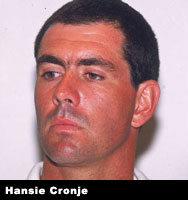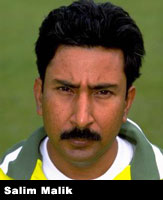Corruption continues as Cronje appeals
John Mehaffey
One of the more chilling lines in the International Cricket Council report into corruption released this year comes about midway through a lengthy document.
 "Despite the publicity given to the ban on Hansie Cronje, the sentences handed out to players from Pakistan and India and the formation of the Anti-Corruption Unit, there are indications that some players are still acting dishonestly to the order of bookmakers," the report said.
"Despite the publicity given to the ban on Hansie Cronje, the sentences handed out to players from Pakistan and India and the formation of the Anti-Corruption Unit, there are indications that some players are still acting dishonestly to the order of bookmakers," the report said.
If corruption is still present, despite the international furore over the Cronje affair and the subsequent scandals, the future seems bleak. More immediately, events in a Pretoria court this week may not bring any comfort to cricket lovers .
On Wednesday the former South Africa captain, banned for life along with two other former international captains, Salim Malik of Pakistan and Mohammad Azharuddin of India, appeals against the ban. If Cronje wins, he could even be back playing for the Free State when the South African season starts next week.
Azharuddin, a Muslim, created a furore in India when he abandoned his wife and children for a Bombay actress in the so-called "Bollywood". Much of the corruption report compiled by former London metropolitan police chief Paul Condon would provide fertile material for Bollywood scriptwriters.
Condon painted an almost melodramatic picture of corrupt cricketers, shady bookmakers, clandestine deals and even a possible murder. For fans throughout the world nothing would ever be the same.
Since the report was published there has been some relief for the authorities. Internal inquiries decided there was no substance to allegations from Indian bookmaker Mukesh Gupta that several prominent players, including former national captains Alec Stewart (England) and Martin Crowe (New Zealand) had taken money from him.
West Indies' authorities are still investigating similar allegations against their leading batsman Brian Lara, another former skipper.
World Cup
The scandal still rumbles on. A Pakistan judicial inquiry has now been instigated to investigate allegations that games involving Pakistan in the 1999 World Cup were fixed.
Under particular suspicion is the group match against Bangladesh at Northampton. Bangladesh, 33-1 outsiders, won by 62 runs and their victory was instrumental in their admission as the 10th test playing nation.
Nothing about the game mattered in the context of the Cup, with Pakistan already through to the second round. But the manner of their defeat was almost comically inept. When Bangladesh batted, Pakistan bowled 28 wides among the 40 extras. When Pakistan batted they lost three wickets to runouts.
The Pakistan inquiry will also investigate the performance of Pakistan umpire Javed Akhtar in the 1998 series between England and South Africa, won 2-1 by England. It was England's first victory in a five-match series for 11 years.
In the deciding match at Leeds, Akhtar awarded nine of the 10 lbw decisions. Eight were against South Africa. Akhtar has denied he was acting under bookmakers' instructions. "Whatever mistakes happened were genuine, not for money," he said.
The most corrosive element in the corruption scandal has been not so much the match-fixing allegations as the myriad opportunities cricket offers for bookmakers to corrupt players. Condon detailed some of them, including betting on the result of the pre-match toss, innings' totals and batsmen and bowlers' individual performances.
Urdu Call
According to a seasoned international cricket reporter, who has watched Pakistan play all over the world, corruption on an international scale started on Pakistan's tour of India in 1979-80.
He said then Pakistan captain Asif Iqbal told India captain Gundappa Viswanath that India had won the toss before the coin hit the ground. The allegation surfaced at a Pakistan judicial inquiry under Justice Malik Qayyum and has subsequently been denied by Asif.
 The reporter said he had also been present on two occasions when Malik had claimed he had won the toss because he had called in Urdu.
The reporter said he had also been present on two occasions when Malik had claimed he had won the toss because he had called in Urdu.
The first time, he said, the New Zealand captain Ken Rutherford complained. On the second, in Zimbabwe, the match referee asked Malik to toss the coin again and call in English.
At the centre of the mess is the enigmatic Cronje, the figure of apparent Christian rectitude who says he was fatally tempted by Satan but is now genuinely repentant and deserves to have his life ban lifted.
At best Cronje's memory seems selective and Judge Edwin King, who headed a South African judicial inquiry, was not sufficiently convinced that he had told everything he knew and so should be given immunity from prosecution.
Whatever the result of the court case, Cronje is irretrievably tarnished. So is the talented Malik and so is Azharuddin, a genuinely great batsman with his magical wristy strokes. So also is Pakistan's Wasim Akram, possibly the greatest left-arm fast bowler ever, who Qayyum said had been "not above board" and should never captain Pakistan again.
Condon's goal is to eliminate corruption by the 2003 World Cup scheduled for South Africa and to this end the Anti-Corruption Unit is examining the plethora of often meaningless one-day tournaments where betting is rife.
"They'll never stop it," said one insider. "The opportunities are too many and the money too tempting for people who would never otherwise see such sums. The authorities have got to cut out all that one-day cricket and they won't because it means too much money for the boards."
Mail Cricket Editor
(C) 2000 Reuters Limited. All rights reserved. Republication or redistribution of Reuters content, including by framing or similiar means, is expressly prohibited without the prior written consent of Reuters. Reuters and the Reuters Sphere logo are registered trademarks and trademarks of the Reuters group of companies around the world.